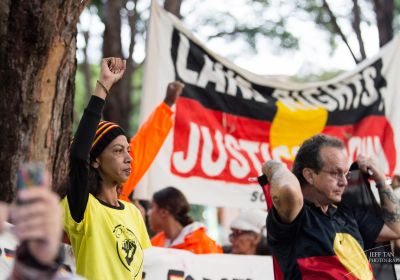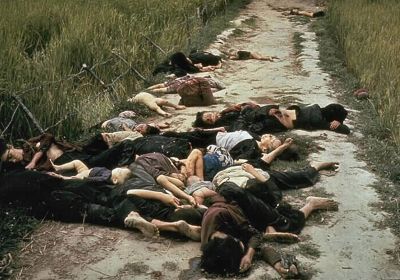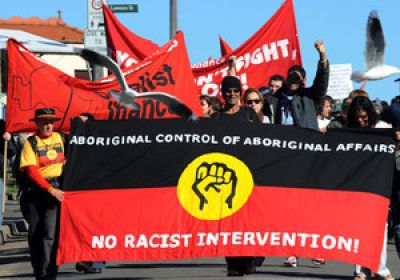“When I graduated from high school - Catholic high school - in 1983, I didn't even think that this would ever be on the map,” said Jeff Mead, now a middle school teacher from San Francisco. The “map” that Mead was referring to took on a drastically new appearance on June 26 when the US Supreme Court announced its five-four decision to strike down state laws banning same-sex marriage. This effectively legalised such marriages across the US.
-
-
 Fans at a US college football match.
It is a rare day when we wonder what National Collegiate Athletic Association (NCAA) coaches are saying about racial justice and social change in the United States.
Fans at a US college football match.
It is a rare day when we wonder what National Collegiate Athletic Association (NCAA) coaches are saying about racial justice and social change in the United States.
-
 President Nicolas Maduro supported reparations for slavery after a ceremony that paid tribute to Afro-Venezuelan independence fighter Pedro Camejo.
Venezuelan President Nicolas Maduro expressed support on June 24 for the Caribbean call for reparations from their former colonial powers.
President Nicolas Maduro supported reparations for slavery after a ceremony that paid tribute to Afro-Venezuelan independence fighter Pedro Camejo.
Venezuelan President Nicolas Maduro expressed support on June 24 for the Caribbean call for reparations from their former colonial powers.
-
 “Protesters rallied in Columbia on Tuesday to demand the flag's removal from South Carolina's state capitol,” the BBC reported on June 24. The protest comes in the aftermath of the racist mass murder carried by Dylann Roof on June 17 in Charleston, South Carolina. Roof, who killed nine people in a historic African American church, was photographed with the flag, which still flies over the state's capitol.
“Protesters rallied in Columbia on Tuesday to demand the flag's removal from South Carolina's state capitol,” the BBC reported on June 24. The protest comes in the aftermath of the racist mass murder carried by Dylann Roof on June 17 in Charleston, South Carolina. Roof, who killed nine people in a historic African American church, was photographed with the flag, which still flies over the state's capitol. -

The mass murder of nine African Americans in Charleston, South Carolina, by a white racist on June 17 has been widely denounced. But to understand this hate crime — a terrorist attack — it has to be put into the broader political context.
-

The BBC’s Panorama program on May 28 made explosive revelations about British state collusion with paramilitaries in the north of Ireland occupied by Britain. It implicates British authorities in the murder of hundreds of people, and in subsequent cover-ups.
-
 Thomas Sankara: An African Revolutionary By Ernest Harsch Ohio University Press, 2014 163 pages, $18.56. A popular uprising in 1983 in Upper Volta (now Burkina Faso), a small and poor land-locked country in western Africa, had led to an obscure, but charismatic army officer becoming head of state. This was inspiring news for those looking for a new breakthrough against imperialism. It had come after the depressing news that Margaret Thatcher's Britain had defeated Argentina in the Malvinas and Ronald Reagan's United States had crushed Grenada's revolution.
Thomas Sankara: An African Revolutionary By Ernest Harsch Ohio University Press, 2014 163 pages, $18.56. A popular uprising in 1983 in Upper Volta (now Burkina Faso), a small and poor land-locked country in western Africa, had led to an obscure, but charismatic army officer becoming head of state. This was inspiring news for those looking for a new breakthrough against imperialism. It had come after the depressing news that Margaret Thatcher's Britain had defeated Argentina in the Malvinas and Ronald Reagan's United States had crushed Grenada's revolution. -
 Western Australian Premier Colin Barnett government is slowly backing away from his controversial announcement that up to 150 remote Aboriginal communities are facing closure. In what he described as “a more nuanced approach”, Barnett is now proposing a “hub and orbit” strategy that will leave some communities bigger and better resourced, others reduced in services and the smallest ones abandoned.
Western Australian Premier Colin Barnett government is slowly backing away from his controversial announcement that up to 150 remote Aboriginal communities are facing closure. In what he described as “a more nuanced approach”, Barnett is now proposing a “hub and orbit” strategy that will leave some communities bigger and better resourced, others reduced in services and the smallest ones abandoned. -

The 40th anniversary of the end of Vietnam War, which claimed the lives of millions of Vietnamese as a result of the United States aggression against the country, was marked on April 30. The war lasted from 1955 to 1975.
-
ADELAIDE Come to Voices of Dissent on Thursday May 14 at 7pm. A Fundraiser for Green Left Weekly. Featuring The Tangled Bank; Kyle Landman, The Young Offenders; Steve O’Malley; Where Was I?; Brendan de Paor. Entry $7. The Jade Monkey, 160 Flinders St, Adelaide. Ph Claudia 0435 108 439. BRISBANE
-
 An irony of the sacking of SBS sports journalist Scott McIntyre for a series of tweets he made on Anzac Day is that the hysterical reaction from politicians and the media, and the consequences he has faced, has only served to prove his initial point. Anzac Day is not about remembering history. To remember what actually happened at Gallipoli 100 years ago, and in Australia’s involvement in wars more generally, is not permissible. Whatever the Anzacs fought and died for, it was not free speech.
An irony of the sacking of SBS sports journalist Scott McIntyre for a series of tweets he made on Anzac Day is that the hysterical reaction from politicians and the media, and the consequences he has faced, has only served to prove his initial point. Anzac Day is not about remembering history. To remember what actually happened at Gallipoli 100 years ago, and in Australia’s involvement in wars more generally, is not permissible. Whatever the Anzacs fought and died for, it was not free speech. -
 Stop the Intervention Collective (STICS) held a forum last month to update participants on the NT Intervention. Dr Shelley Bielefeld, lecturer in law at UWS, visiting scholar at Jumbunna Indigenous House of Learning at UTS and the Centre for Aboriginal Economic Policy Research at ANU, spoke at the forum. Afterwards she spoke to Green Left Weekly. * * * How does the government justify the Intervention?
Stop the Intervention Collective (STICS) held a forum last month to update participants on the NT Intervention. Dr Shelley Bielefeld, lecturer in law at UWS, visiting scholar at Jumbunna Indigenous House of Learning at UTS and the Centre for Aboriginal Economic Policy Research at ANU, spoke at the forum. Afterwards she spoke to Green Left Weekly. * * * How does the government justify the Intervention?